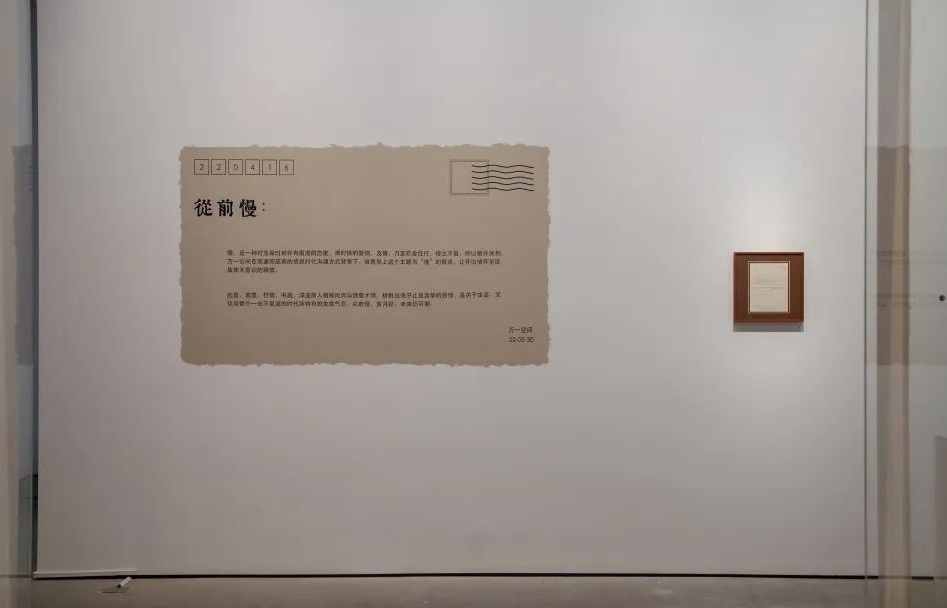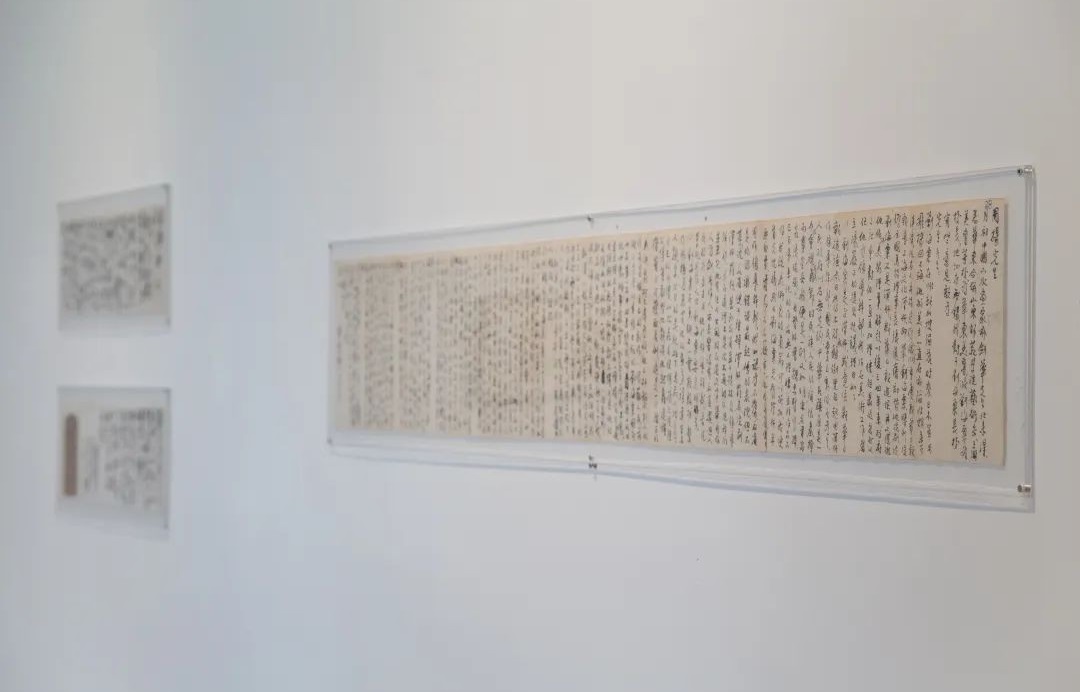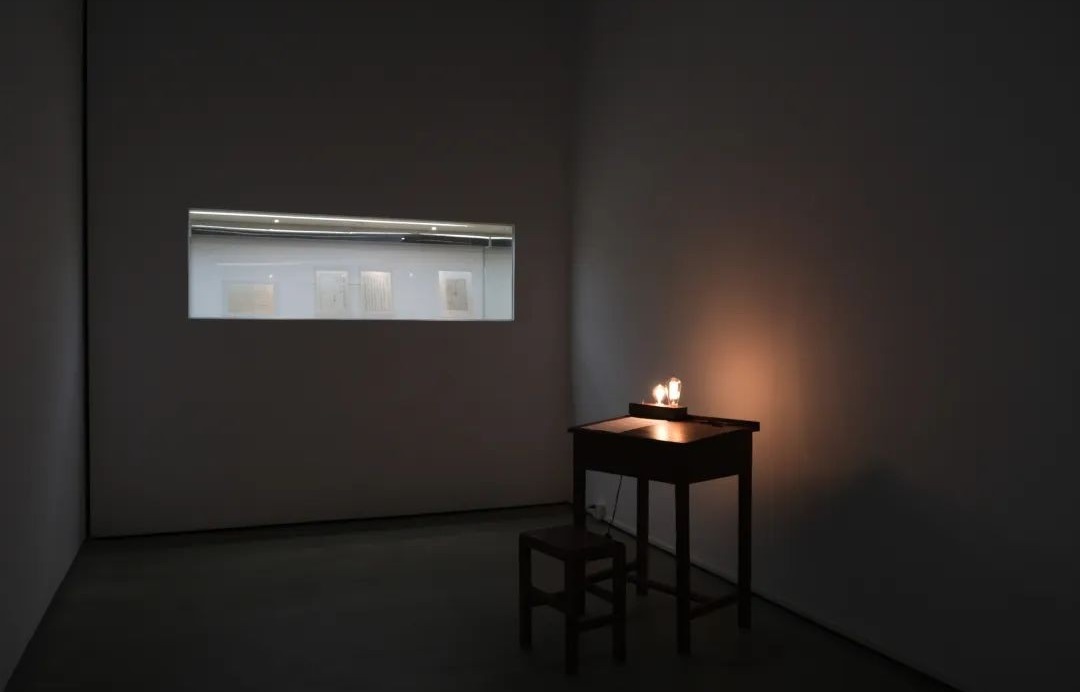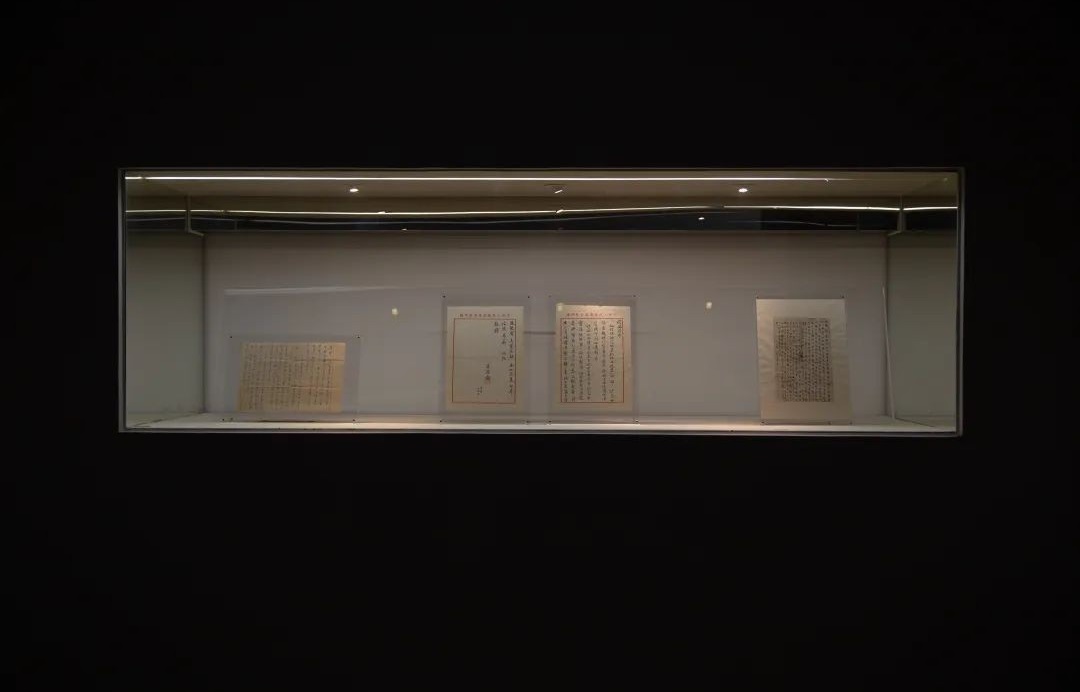Video Link: In the Gallery: What Chinese Celebrities Wrote in Letters From 19th to 20th Century | W.ONESPACE
W.ONESPACE is honored to present the exhibition "A Clock Stopped". The exhibition selects letters of the literati and important persons from the 19th and 20th century, including Liang Qichao, Xu Beihong, Chen Yinke, Zhang Daqian, Zao Wou-ki, Wang Shixiang, Qi Gong, Wu Changshuo, Lu Xiaoman, Jiang Biwei and Zhang Daofan. We have combed those letters with different perspectives: romance, friendship, poetry for literati friends, historical value and so forth. Through private dialogues we can feel the temperament of people at that time and what a romantic time the old day was. It is only a fraction of the whole but has a lasting charm to spark the common emotions of the people who once alive.
Letters have the character of humanistic solicitude all over the world as they are called "the gentlest art" in the West. In the East, letters with rich etiquette content and cultural value could also be the best way to reflect the interests, tastes, and skills of calligraphers.
The transmission of emotions and the accumulated time make the meaning of handwritten letters even more profound. Nowadays, technical revolution has brought disruptive changes to communication. People can quickly realize information transmission by tapping on the keyboard or simply sending a voicemail. People benefit from this, but at the same time they are virtually away from the form of writing. In the past, people were able to achieve a mental state when they were writing. A true temperament was given through succinct text and exquisitely laid out, also with a high degree of writing freedom and smooth writing state. Su Dongpo (苏东坡, AD1037-1101) once said about calligraphy: “It is not a deliberately process, but naturally revealed.” For example, Manuscript for Sacrifice to Nephew(祭侄文稿, AD758) is a brilliant work of expressing grief, anger and agony. There is no possibility of replicating a second one. Therefore, writing is a way of life, brushes and inks are daily based, both forge the leisurely expression of private emotions.
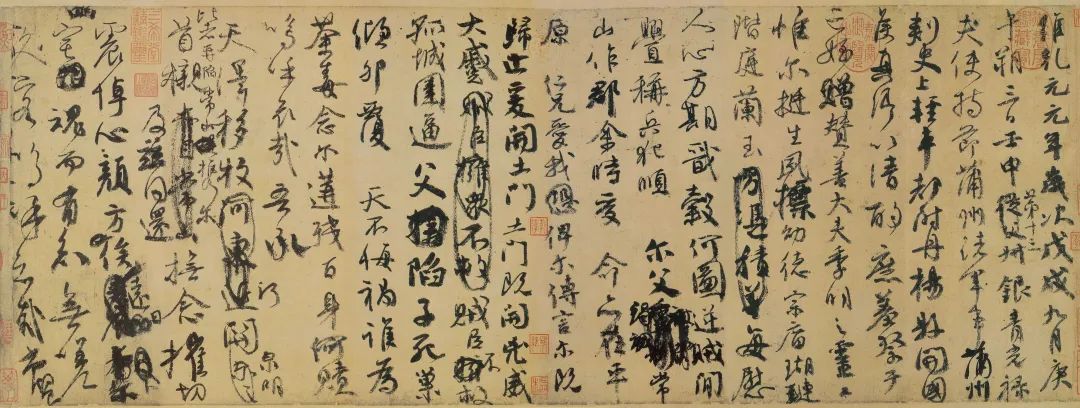
"Once Upon a Time Slow"(A Clock Stopped) is a poem written by Mr. Mu Xin. In the pass "slowness" has a sense of beauty, which can be decoded as a simple delicacy, a philosophy of life, lingering in the eternal atmosphere that the people at that time did not notice. In the old days when you quietly waited for a person, you would carefully select a plain envelope and decorated papers, then concentrate on writing, wholeheartedly. These words cannot be easily erased without trace like the delete bottom on the keyboard, nor can they be read as convenient as those on the telephone, where lacks the aftertaste. Every brushstroke is full of condensation of thought, even the alteration is the superposition of traces, gathering the writer's sincere emotions. Even if the words are plain, they are also meaningful. Waiting for a reply took three or five days, even to a week. Time becomes a catalyst for missing someone. More spiritual expectations emerge between the sending and delivery of letters, and they even become a desire. In Lu Xiaoman's letter to Tao Menghe, she showed her deep concern for her husband Xu Zhimo. In fact she was worried about whether her lover's winter clothes were enough. Lu Xiaoman attached great importance to Xu’s life so that she cautiously entrusted Tao Menghe, their common friend, to bring her concern and inquiry to him. The connection between the two ends of a letter is slow and has to withstand the time passing by, thus making it like meeting with each other face to face.
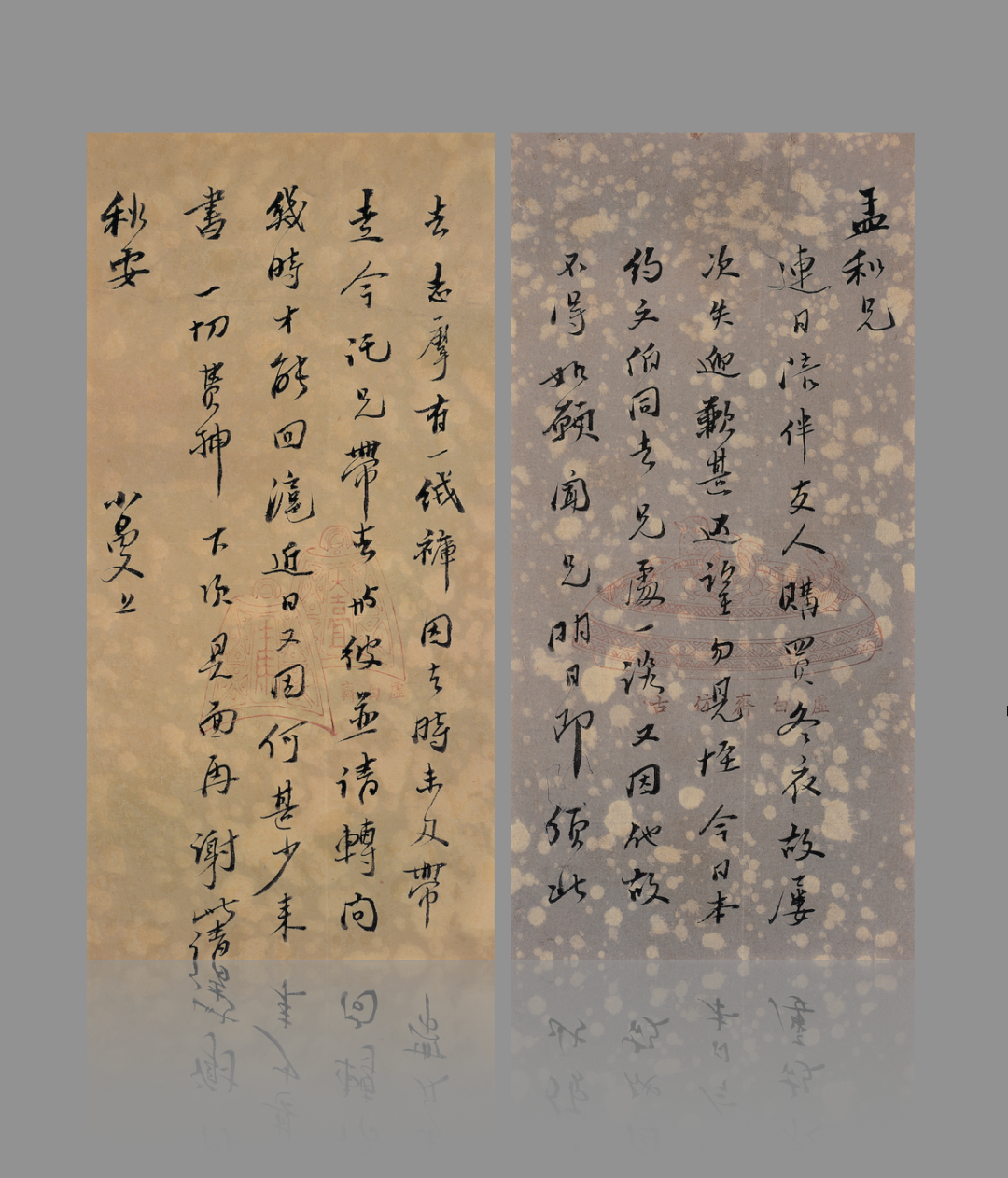
Slowness is a kind of pious attitude towards life at all times. Love, friendship, and even basic necessities were hard to obtain in the pass, so they were particularly profound. In a letter from Zao Wou-ki to Nesto Jacometti, the publisher he worked with at that time, the young Zao Wou-ki sincerely revealed the details of his painting sales income and life in Paris in the 1950s, and then invited Jacometti to write a few words for his printmaking teacher Johnny Friedlander’s new exhibition. For a newcomer, a good friendship in Paris was so precious that he was inspired and guided by "good teachers and friends" and tried his best to repay them.
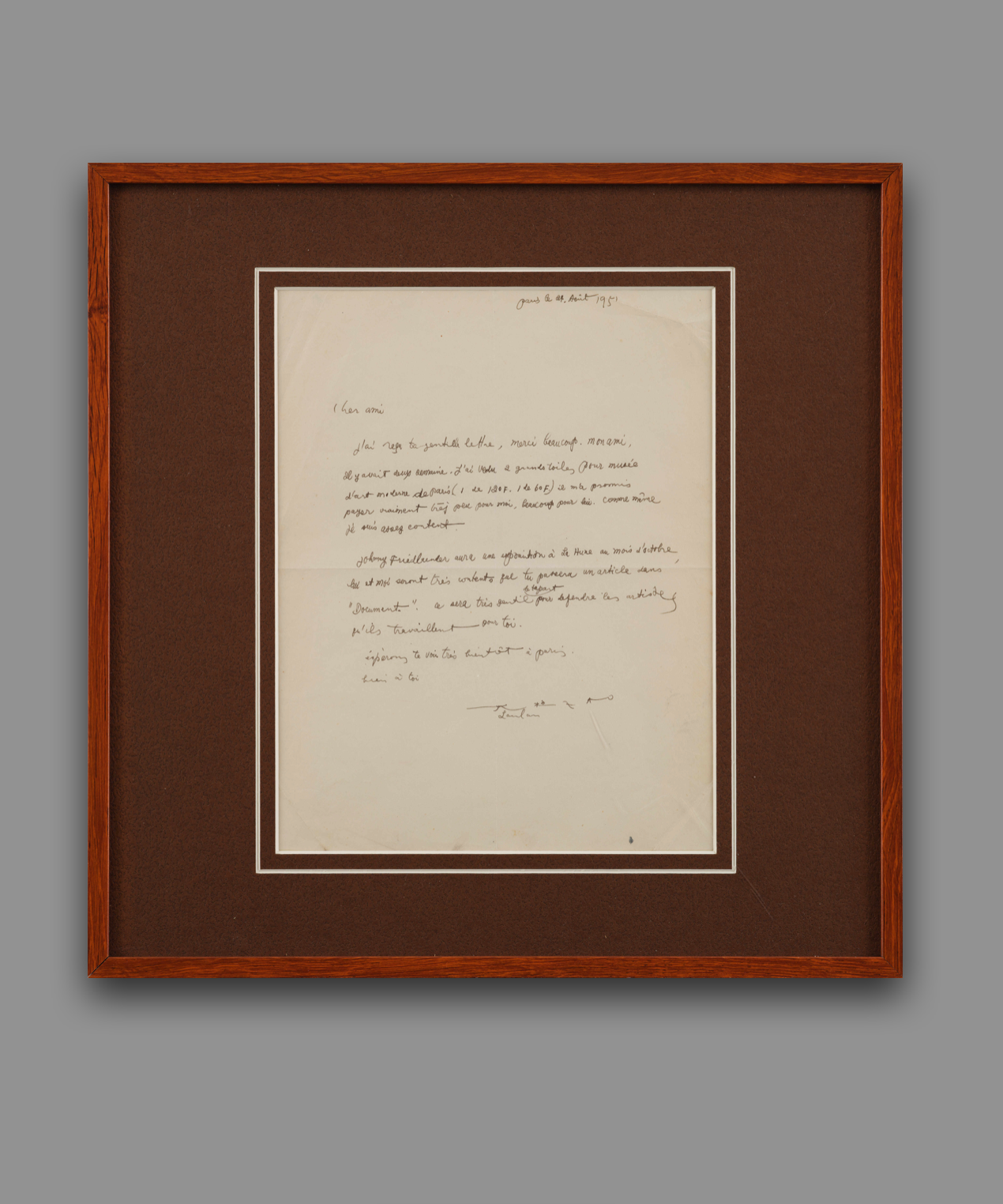
The contemporary context is changing dramatically from time to time. Many things are easy to get but discarded quickly. Therefore, materials and information seem to lose the possibility of being integrated slowly, they are involved in disputes and people in a hurry have no time to concentrate. The ink is replaced by digital text, papers are replaced by screens, communication composed by fragmented dialogues, which are convenient but lack the sincere and simple intention at the same time. At this time, we can’t help missing the "slow" life in the past. This nostalgic plot either comes from the void of fast lives or the desire for communicating during the isolation of the epidemic. Anthropologist Oberg once proposed that the "cultural shock” is a psychological reflection caused by the loss of all familiar social communication symbols. The development of science and technology rises along with the progress of the times. In those complex and hasty cities, everyone is tired of running and being a pinion to spin for a high-speed city. The relationship between people is indifferent with the transformation of communication tools, and there is an objective sense of alienation in the city. People are in a hurry, their visions are suspended, their cognition and memory of beauty are shallow and decaying compared with our ancestors. However, in this city where the pause and play buttons were pressed repeatedly, the “slow”paces in the past particularly inspire people's introspection and reflection.
Slowness is also a kind of ingenuity and somehow a balance. Craftsmen with ingenuity do things slow for most of the time. They often repeat the simplest actions gently and silently, pouring their undivided spirits and faiths on the object. Technology development is ongoing and evolving. However in the speeding times, a letter can peel off the noise of human voice and make everything slow again. Wang Jingyi, a poet of the Qing Dynasty, wrote in a letter to Li Huan that depicts"一春花似雾中看,风信深愁到牡丹。闻到牡丹春欲去,迎春容易送春难"( Spring flowers hide in fog, sorrow goes with wind to the peony blossom. When I can smell the peony, that means spring will nearly pass away. So maybe it’s easy to embrace the spring but hard to say goodbye.). Reading the inkblot on the paper, sensing the up and downs between the words, and then touching the elegant letter paper, the unique sense of loss in spring suddenly appears.
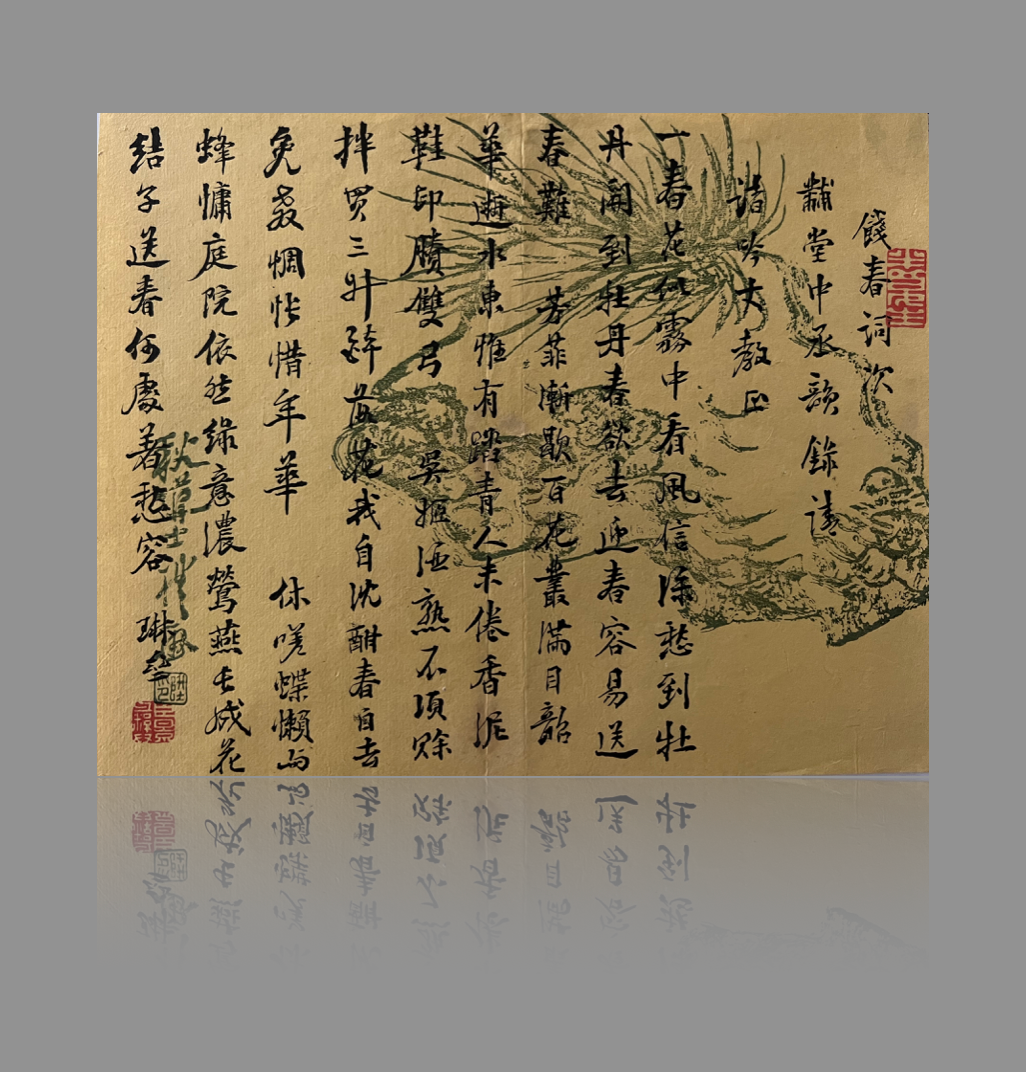
"Admonitions for the Yan clan" (颜氏家训AD 6century)states: The letters are just like the countless faces of the senders. Now it’s hard to feel them. Staring at these old letters, the emotional thickness and life experience carried on them are still irreplaceable. In this special period of time, W.ONESPACE sincerely presents this exhibition with the theme of "slowness", letting the nostalgic feelings unconsciously release jointly. Focus, significate, express and write, those processes permeated with the spirit of our ancestors and their poetic talents, which not only reflecting sincere feelings, but also comprehensions about life, culture and the unique breath of that gone era. The past is slow, the years were good, and the future should be expected.
·
W.ONESPACE is honored to present the exhibition "A Clock Stopped". The exhibition selects letters of the literati and important persons from the 19th and 20th century, including Liang Qichao, Xu Beihong, Chen Yinke, Zhang Daqian, Zao Wou-ki, Wang Shixiang, Qi Gong, Wu Changshuo, Lu Xiaoman, Jiang Biwei and Zhang Daofan. We have combed those letters with different perspectives: romance, friendship, poetry for literati friends, historical value and so forth. Through private dialogues we can feel the temperament of people at that time and what a romantic time the old day was. It is only a fraction of the whole but has a lasting charm to spark the common emotions of the people who once alive.
Letters have the character of humanistic solicitude all over the world as they are called "the gentlest art" in the West. In the East, letters with rich etiquette content and cultural value could also be the best way to reflect the interests, tastes, and skills of calligraphers.
The transmission of emotions and the accumulated time make the meaning of handwritten letters even more profound. Nowadays, technical revolution has brought disruptive changes to communication. People can quickly realize information transmission by tapping on the keyboard or simply sending a voicemail. People benefit from this, but at the same time they are virtually away from the form of writing. In the past, people were able to achieve a mental state when they were writing. A true temperament was given through succinct text and exquisitely laid out, also with a high degree of writing freedom and smooth writing state. Su Dongpo (苏东坡, AD1037-1101) once said about calligraphy: “It is not a deliberately process, but naturally revealed.” For example, Manuscript for Sacrifice to Nephew(祭侄文稿, AD758) is a brilliant work of expressing grief, anger and agony. There is no possibility of replicating a second one. Therefore, writing is a way of life, brushes and inks are daily based, both forge the leisurely expression of private emotions.

祭侄文稿 颜真卿
现藏于台北故宫博物院,图片:台北故宫博物院
现藏于台北故宫博物院,图片:台北故宫博物院
"Once Upon a Time Slow"(A Clock Stopped) is a poem written by Mr. Mu Xin. In the pass "slowness" has a sense of beauty, which can be decoded as a simple delicacy, a philosophy of life, lingering in the eternal atmosphere that the people at that time did not notice. In the old days when you quietly waited for a person, you would carefully select a plain envelope and decorated papers, then concentrate on writing, wholeheartedly. These words cannot be easily erased without trace like the delete bottom on the keyboard, nor can they be read as convenient as those on the telephone, where lacks the aftertaste. Every brushstroke is full of condensation of thought, even the alteration is the superposition of traces, gathering the writer's sincere emotions. Even if the words are plain, they are also meaningful. Waiting for a reply took three or five days, even to a week. Time becomes a catalyst for missing someone. More spiritual expectations emerge between the sending and delivery of letters, and they even become a desire. In Lu Xiaoman's letter to Tao Menghe, she showed her deep concern for her husband Xu Zhimo. In fact she was worried about whether her lover's winter clothes were enough. Lu Xiaoman attached great importance to Xu’s life so that she cautiously entrusted Tao Menghe, their common friend, to bring her concern and inquiry to him. The connection between the two ends of a letter is slow and has to withstand the time passing by, thus making it like meeting with each other face to face.

陆小曼致陶孟和 信札一通二纸
质地形式:纸本镜心;
笺纸:24 x 12 cm(单张)
质地形式:纸本镜心;
笺纸:24 x 12 cm(单张)
Slowness is a kind of pious attitude towards life at all times. Love, friendship, and even basic necessities were hard to obtain in the pass, so they were particularly profound. In a letter from Zao Wou-ki to Nesto Jacometti, the publisher he worked with at that time, the young Zao Wou-ki sincerely revealed the details of his painting sales income and life in Paris in the 1950s, and then invited Jacometti to write a few words for his printmaking teacher Johnny Friedlander’s new exhibition. For a newcomer, a good friendship in Paris was so precious that he was inspired and guided by "good teachers and friends" and tried his best to repay them.

赵无极致友人内斯托·雅科梅蒂 信札一通一纸
质地形式:纸本镜心;笺纸:26.5 × 20.5 cm
质地形式:纸本镜心;笺纸:26.5 × 20.5 cm
The contemporary context is changing dramatically from time to time. Many things are easy to get but discarded quickly. Therefore, materials and information seem to lose the possibility of being integrated slowly, they are involved in disputes and people in a hurry have no time to concentrate. The ink is replaced by digital text, papers are replaced by screens, communication composed by fragmented dialogues, which are convenient but lack the sincere and simple intention at the same time. At this time, we can’t help missing the "slow" life in the past. This nostalgic plot either comes from the void of fast lives or the desire for communicating during the isolation of the epidemic. Anthropologist Oberg once proposed that the "cultural shock” is a psychological reflection caused by the loss of all familiar social communication symbols. The development of science and technology rises along with the progress of the times. In those complex and hasty cities, everyone is tired of running and being a pinion to spin for a high-speed city. The relationship between people is indifferent with the transformation of communication tools, and there is an objective sense of alienation in the city. People are in a hurry, their visions are suspended, their cognition and memory of beauty are shallow and decaying compared with our ancestors. However, in this city where the pause and play buttons were pressed repeatedly, the “slow”paces in the past particularly inspire people's introspection and reflection.
Slowness is also a kind of ingenuity and somehow a balance. Craftsmen with ingenuity do things slow for most of the time. They often repeat the simplest actions gently and silently, pouring their undivided spirits and faiths on the object. Technology development is ongoing and evolving. However in the speeding times, a letter can peel off the noise of human voice and make everything slow again. Wang Jingyi, a poet of the Qing Dynasty, wrote in a letter to Li Huan that depicts"一春花似雾中看,风信深愁到牡丹。闻到牡丹春欲去,迎春容易送春难"( Spring flowers hide in fog, sorrow goes with wind to the peony blossom. When I can smell the peony, that means spring will nearly pass away. So maybe it’s easy to embrace the spring but hard to say goodbye.). Reading the inkblot on the paper, sensing the up and downs between the words, and then touching the elegant letter paper, the unique sense of loss in spring suddenly appears.

王景彝致李桓 信札一通一纸
质地形式:纸本镜心;笺纸:18.3 x 22.5 cm
质地形式:纸本镜心;笺纸:18.3 x 22.5 cm
·
展览鸣谢开拍国际、藏家王鹏先生、赵绍华先生、胡若辉先生的鼎力支持。

